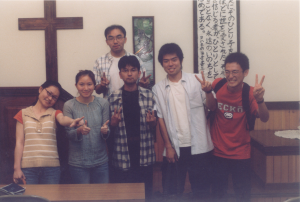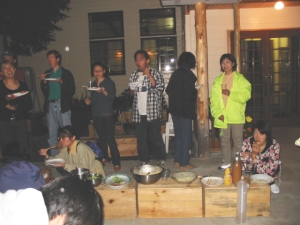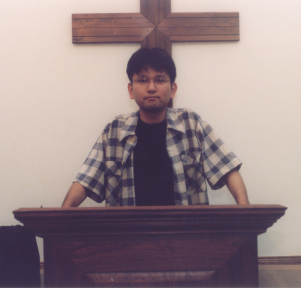Relational Ministries
 From left to right, Pim, Pim’s friend, Hiro, Makoto, Yasu, Hironari. Except for Makoto, all are students at Hirosaki University. |
 July 4th party (Courtesy David Kim) |
Most of our conversation happened on Sundays after the service, but we did have several opportunites at other times. One Sunday evening we went bowling at the local lanes, which was fun and a good opportunity to talk to the Japanese (and a couple of the JETs). Kazuki and I went to KGK (Japanese InterVarsity) two Mondays, where we saw a few of the people from the chapel, and made friends with some of the others. We also had a July 4th party, where we made American food (acquiring hamburger buns was difficult) and invited any English speaking Japanese who were interested. Additionally, a few of Mrs. Ghent’s English-speaking (Japanese) friends also came. This was a good time to socialize while grilling the meat and eating. The fireworks, which were legal to set off inside the city, were inexpensive and fun. We also had a short sack race and an “Amazing Grace” hymn-sing and explanation (in Japanese). Even though it was a former British slave-trader who wrote the hymn, the melody is apparently American and it seems to be considered a classic American hymn. Fortuitous, that, since it succinctly and eloquently explains the Gospel message.
 Makoto NAKASHIMA
|
Our ministry was not just to non-Christians, however. By its nature, missionary work will almost always involve serving those who become Christians, and their growth is as important as the non-Christians. So an important part of our time was working with and getting to know the members of the church. We helped out with almost all the activities of the church while we were there, as much as our Japanese permitted. Since we lived on the second floor of the church, we also had occasion to see church members from time to time, to help with chores, and to socialize. One cannot serve without knowing the people for whom and with whom you serve; being a part of the local church is essential to understanding how your ministry fits in with the church body.
Five weeks is a short time and I felt that we left just as our relationships were beginning. Although we probably did not have the time and language ability to explain in words all that we would have liked to, our time was useful in other ways. By coming from halfway across the world, in God’s name for God’s work, we were both an example to the Christians of God’s work, and to non-Christians, of the depth of our belief. Although it did not occur to me at the time, merely being friendly and interested in others is a good example of showing Jesus’ love. And although we may not be able to build upon these relationships much, others in the church can build on what we have started.